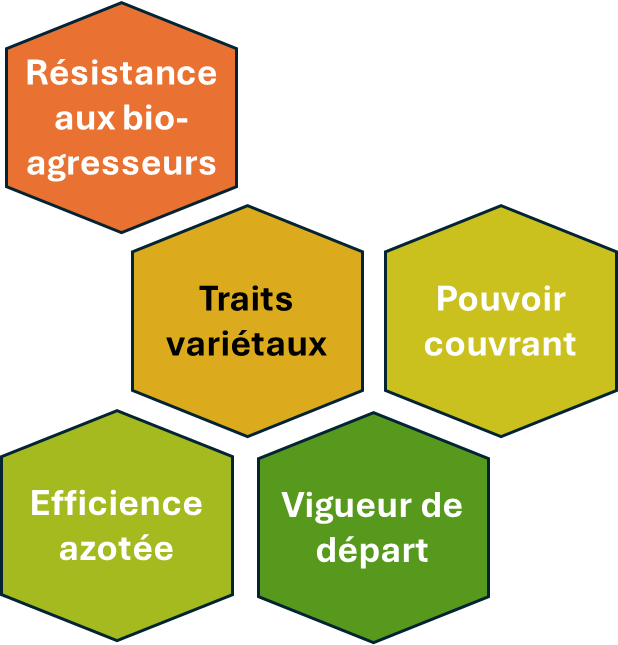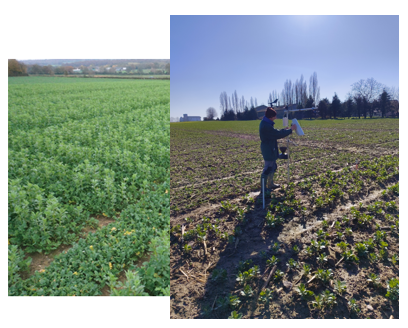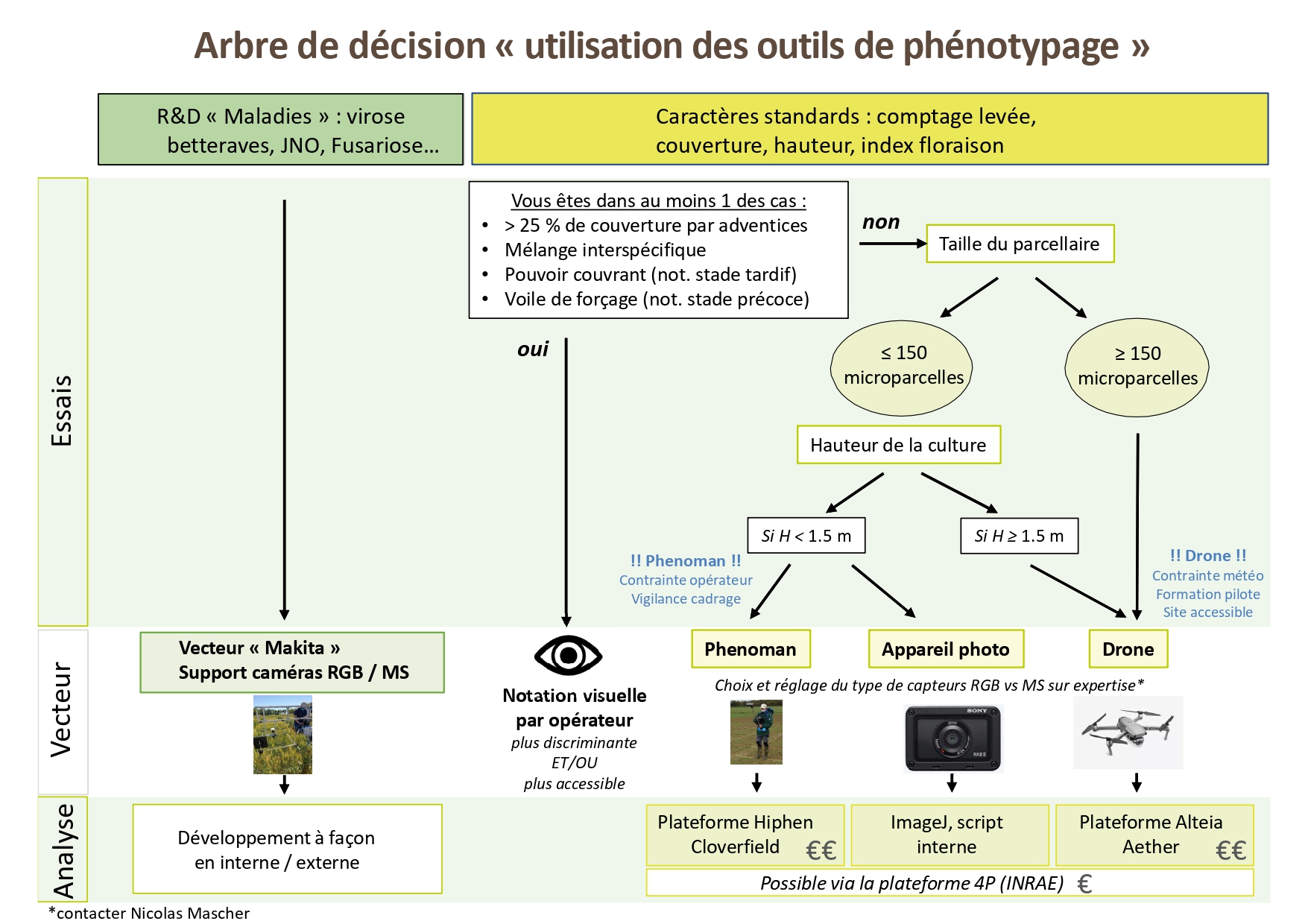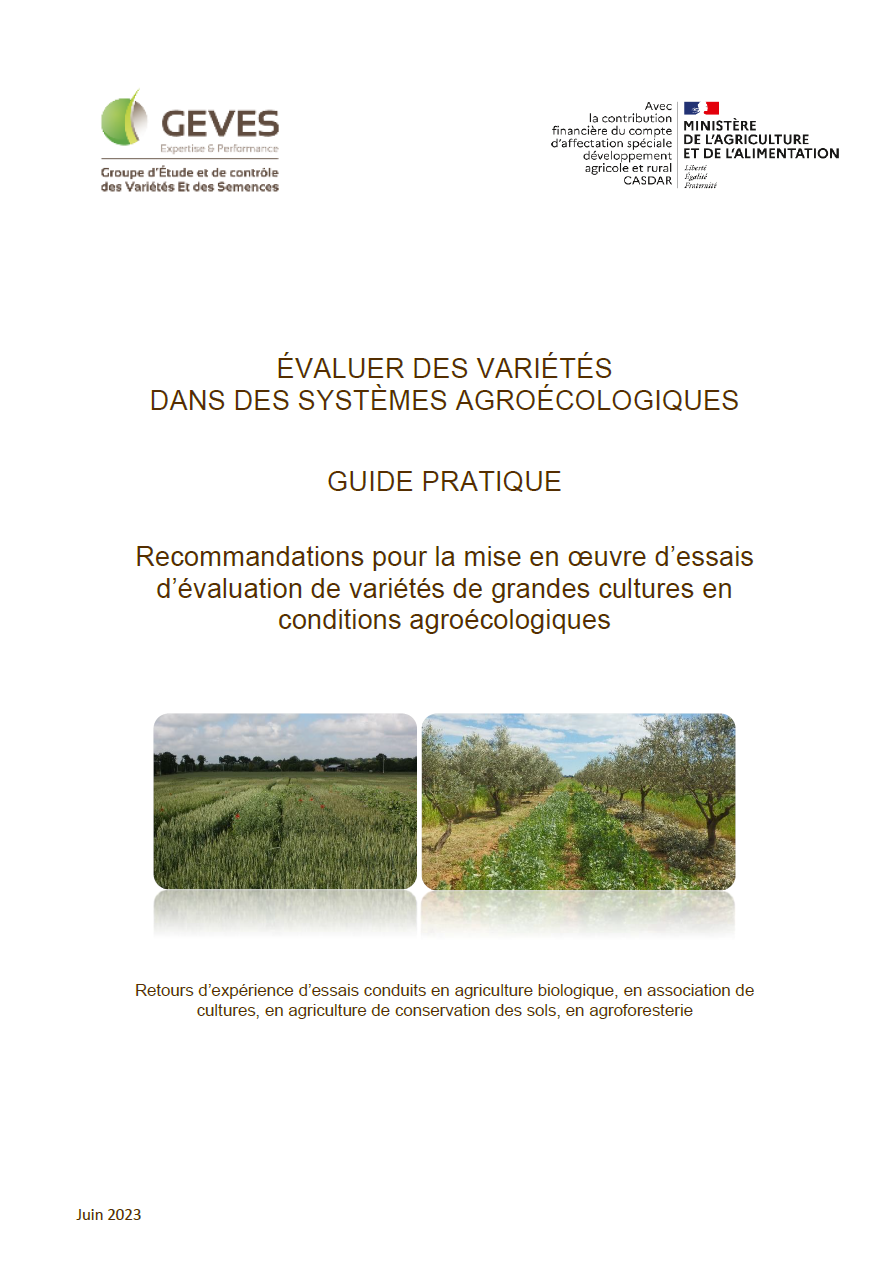Agroecology at the centre of variety evaluation
Agroecology is based on the conception of production systems that draw on the functionalities offered by ecosystems to improve crop production while aiming to reduce pressure on the environment and preserve natural resources. In particular, it is based on an increase in the services provided by crops and the diversification of cropping systems, leading to a need for more species and adapted varieties.
GEVES and the CTPS are committed to supporting French agriculture in its agro-ecological transition, in line with the objectives defined by the seeds and seedlings sector (SPAD plans). This commitment informs the guidelines set by the CTPS Scientific Committee. It is also one of the main thrusts of the GEVES 2030 strategy and its 2024-2028 R&D policy, which aims to innovate in terms of variety evaluation in support of agro-ecology within the GEVES trial networks and experimental sites.
Which varieties for agroecology?
The Scientific Committee of the CTPS has been mandated by the Plenary Committee of the CTPS to shed light, on the basis of scientific and technical literature, on the implications of the agro-ecological transition in terms of species, varieties, breeding, evaluation and production of seeds and seedlings, to provide input for discussions on changes to the regulatory system for variety registration.
This referral, carried out between September 2020 and October 2021, and submitted to the Plenary Committee in November 2021, is an important contribution to the debate on the future of agriculture, the necessary development of the range of varieties, the way this range is constituted and the role of the CTPS in guiding and evaluating genetic progress. It provides input for the SPAD2 plan.
The study highlights the need to :
- explore new varietal structures and new specific and varietal compositions in cultivated communities
- introduce new species to obtain new ecosystem services,
- explore new cover structures, for example with service plants, companion crops or agroforestry.
These new contexts mean new traits to be phenotyped at the time of variety creation and evaluated at the time of registration, some of which have yet to be specified. It also highlights the importance of thinking about, creating and therefore evaluating a variety within its production system, leading to a finer-tuned combination of genetic improvement, agronomy and, more broadly, all the methods and resources for managing and protecting crops. This will also require all technologies to be mobilised to serve this objective. A rethink of interdisciplinarity is essential. The success of this major transition in terms of the supply of species, varieties, seeds and seedlings requires a dynamic that is not only French, but also European and international.
Evaluating varieties for agroecology
With the evolution of the agricultural production context (agro-ecological transition, development of organic agriculture, climate change, etc.), the conditions and criteria for variety registration must be adjusted in line with the objectives of the SPAD Plans and the conclusions of the “Which varieties for agro-ecology” report.
Candidate varieties for registration are evaluated in trial networks that are diversified in terms of cropping practices. Reference can be made in particular to the inclusion in our national variety evaluation networks:
Other practices are implemented throughout the evaluation network to limit the use of chemical inputs and encourage more tolerant or more efficient varieties.
For the evaluation of beet varieties, the triggering of fungicide treatments is based on the behaviour of a control variety that is tolerant to foliar diseases.
Rapeseed varieties are evaluated in trials conducted with 40 units of nitrogen less than the recommended optimum dose (an average of 20% less nitrogen applied).
Varietal characteristics of interest to agro-ecology are also evaluated and may be taken into account when deciding whether varieties are eligible for registration in the French Catalogue.


Growing oilseed rape under spring beans
GEVES is continuing its work on evaluating varieties for agro-ecology, in particular through its involvement in research programmes and projects. The latest of these is the AgroEcoPhen project funded by the PEPR AgroEcologie et Numérique (2023-2028), which aims to improve variety evaluation by deploying phenotyping and envirotyping systems in a larger number of experimental parcel, and by developing data analysis to provide access to innovative traits of interest in relation to agroecology.
The objectives of the RESO (2020-2021: Which variety evaluation networks to use to identify and register varieties adapted to agroecology?) and RESO2 (2021-2023: Impact of the agroecological transition on variety evaluation methods and the design of trial networks) projects, which received a CASDAR grant to support the CTPS sections, were to develop variety evaluation methods and adapt trial networks to identify and characterise varieties adapted to agroecological systems.
RESO2 aimed to put the conclusions of the RESO project into practice. It was structured around three main actions:
- the study of the measurement of characteristics and aptitudes of interest for agroecological systems (competitiveness against weeds, vigour and suitability for association),
- the definition of trials under agro-ecological conditions and their place in the registration system
- the evolution of decision rules (quotations) over the last 30 years to build tomorrow’s rules and encourage the registration of varieties for these systems.
This third section was carried out in synergy with the MUSE (MUlti-SErvice) project. This project, funded by the Groupement d’Intérêt Scientifique Grandes Cultures (GIS GC) for a period of 12 months (2022-2023), has shed light on the methodological and technical bases for a multi-criteria evaluation of varieties that takes into account the expected changes in production systems (agro-ecology, climate change).
The choice of vector for phenotyping varietal characteristics is an important element to take into account when establishing a varietal evaluation protocol.
To encourage the integration of agro-ecological trials into evaluation networks, experimenters need to be given the means to conduct trials in such farming systems.
Preserving biodiversity at experimental stations
Biodiversity is at the centre of the principles of agro-ecology. Through natural regulation, it provides some of the ecosystem services that help to reduce the use of inputs in our farming systems. Adapting our practices and encouraging biodiversity at our experimental stations is therefore a key issue when it comes to evaluating the varieties of tomorrow.
In its 2030 strategy, GEVES aims to strengthen its agro-ecological transition in the management of its 5 experimental areas by :
- significantly reducing the use of plant protection products, especially those classified as CMR or EP (endocrine disruptors);
- improving the conservation of water resources and reducing the use of mineral fertilisers;
- evaluating the biodiversity present on its experimental sites and restoring it where necessary.
For this reason, each station encourages the use of environmentally-friendly cultivation practices, the establishment and maintenance of agro-ecological infrastructure (hedges, ponds, fallow land, grassed strips, etc.) or any other action such as the installation of nesting boxes, perches, beehives, etc., helping to maintain or even increase biodiversity in our parcel and surrounding areas.
A monthly biodiversity survey is also carried out at two of our stations, which take part in the Observation Agricole de la Biodiversité (OAB) as part of their membership of the ARBRE network, a network of farmers in Pays de la Loire, to make progress in reconciling biodiversity and agriculture.
And to evaluate and consolidate this good practice, the 5 GEVES units are committed to a Level 3 “High Environmental Value (HEV)” environmental certification scheme for farms.
For more details and to find out what each experimental unit is doing, click here.



